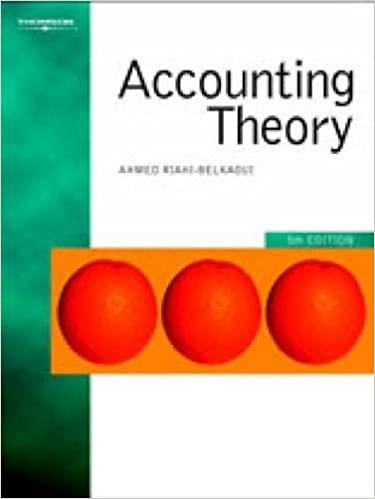Question
Rachels Deli (RD) is a deli that sells fresh sandwiches, soups, and salads. Rachels Deli was founded by Rachel and Kyle, who are brother and
Rachels Deli (RD) is a deli that sells fresh sandwiches, soups, and salads. Rachels Deli was founded by Rachel and Kyle, who are brother and sister, and began as a small, local deli in Edmonton. Based on rave reviews of their salmon grilled sandwich, Rachel and Kyle have decided to expand operations within Alberta. As part of the expansion plans, all of the assets were rolled over into a newly formed corporation that has a fiscal year end of December 31, 2020. The corporation issued 50,000 shares to each of Rachel and Kyle for $3 per share. Upon incorporation, RD also received a 10-year, 9%, $250,000 loan with annual payments from the First Bank of Edmonton to help finance the expansion. During their first year of operations, Rachel and Kyle decided to hire Lebeau and Liang LLP (L&L) to help develop accounting policies that are consistent with ASPE for various new transactions. You, a senior accountant with L&L, have been assigned to the RD file and met with Rachel and Kyle to discuss the various new issues. Rachel and Kyle have provided you with the following information regarding the new issues:
1. RD implemented a customer loyalty program at the beginning of the year. Each customer receives one Grill Point for every large sandwich that they purchase. A customer receives a free large sandwich once they earn 10 Grill Points. A large sandwich sells for an average of $5 and costs an average of $3 to produce. As of year end, a total of 23,500 Grill Points were issued. Rachel and Kyle did not know how to account for this program and stated that they will record the expense of the free sandwich when a customer redeems their points. Fixed costs are approximately 30% of gross margin.
2. To help finance their expansion across Alberta, RD issued 10,000 preferred shares to a group of private investors for $10 per share. The preferred shares carry a 10% annual, cumulative dividend yield and are redeemable by RD. The dividend rate was issued at such a high level because RD does not have access to any other sources of capital in the current year. In five years, the dividend is expected to double. Given that they are preferred shares and not retractable, Rachel and Kyle recorded these shares as equity.
3. Given the volatility of commodity prices, RD has entered into a forward contract with the First Bank of Edmonton. On April 1, RD has locked the price of 100,000 kg of wheat at $0.75/kg. Upon its inception, RD did not have to put forth any cash. All cash transfers will take place on settlement. As at December 31, the price of wheat is trading on the Chicago Board of Trade at $0.87/kg. Rachel and Kyle have made no entries at year end and will record the cost of goods sold with a wheat price of $0.75 in the next fiscal year.
4. On August 1, the company reacquired and cancelled 1,500 of Rachels and 1,500 of Kyles shares at $4 per share. All 3,000 shares were re-issued to Khaled, a long-time friend, at a price of $5 per share. Rachel and Kyle were unsure of how to account for these transactions.
5. On January 1, RD purchased a new grill. The purchase was financed through an interest-free five-year vendor loan, whereby RD is required to pay back $5,000 in each year. Rachel and Kyle are excited about this financing promotion because they would have to pay 9% interest to borrow the money from the bank. Rachel and Kyle recorded an asset and liability at $25,000. At year end, the $5,000 cash payment was recorded as a reduction of the long-term liability. RD uses the straight-line method to depreciate the asset, which has a seven-year useful life.
To protect its investment, the First Bank of Edmonton has included a restrictive covenant whereby RD cannot have a debt-to-equity ratio in excess of 1:1. Upon inception, the debt to equity ratio is 0.83:1. Both Rachel and Kyle have expressed their pleasure with the debt to equity ratio. The partner has asked that you prepare a report that helps Rachel and Kyle understand the implications, if any, of the debt-to-equity covenant at year end. The partner reminds you that it may be ideal to start by first analyzing the accounting issues. Required Prepare the report
Step by Step Solution
There are 3 Steps involved in it
Step: 1

Get Instant Access to Expert-Tailored Solutions
See step-by-step solutions with expert insights and AI powered tools for academic success
Step: 2

Step: 3

Ace Your Homework with AI
Get the answers you need in no time with our AI-driven, step-by-step assistance
Get Started


